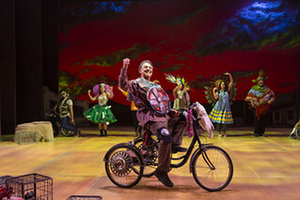Review: QUIXOTE NUEVO: Tilting At Balloons

Quixote Nuevo
Written by Octavio Solis, Directed by KJ Sanchez; Scenic Design, Takeshi Kata; Costume Design, Rachel Anne Healy; Lighting Design, Brian J. Lilienthal; Composer & Sound Design, David R Molina; Co-Composer, Eduardo Robledo; Music Director, Jesse Sanchez; Fight Director, Ted Hewlett; Production Stage Manager, Rob Chikar; Stage Manager, Emily F. McMullen
CAST (in alphabetical order): Juan Manuel Amador, Orlando Arriaga, Hugo E. Carbajal, Gisela Chípe, Emilio Delgado, Krystal Hernandez, Ivan Jasso, Sarita Ocón, Gianna DiGregorio Rivera
Performances through December 8 at Huntington Theatre Company, 264 Huntington Avenue, Boston, MA; Box Office 617-266-0800 or www.huntingtontheatre.org
A septuagenarian suffering from Alzheimer's may seem an unlikely hero, but in Quixote Nuevo, playwright Octavio Solis' adaptation of Miguel Cervantes' Don Quixote, a retired Mexican-American college professor fearlessly takes on the Border Patrol, aids migrants, and models the importance of resilience while searching for his long-lost love. Pursued by death in the form of a colorful band of "calacas" from the spirit world, his worried sister and niece, and the therapist and priest who want to take him to an assisted living facility, Jose "Joe" Quijano becomes convinced that he is Don Quixote and sets off on a quest to find his Dulcinea, the migrant girl he fell in love with as a boy on his father's farm.
While the life-affirming, romantic, and heroic elements of the 17th century tome remain, Solis shifts the action from Spain to La Plancha, a fictional small border town near El Paso, Texas. By setting the action in the present day, he opens a window into the effects of Trump-era policies on the Mexican-American community in general, and these characters in particular. The border wall is only one of several barriers (the others being metaphysical) Quijano (Emilio Delgado) must confront, and he seems to relish the opportunity to raise his sword against the Border Patrol and its surveillance balloons.
The line between reality and fantasy is in flux, both in Quijano's mind and for the viewing audience. Flashbacks featuring young Joe (Ivan Jasso) and Dulcinea (Gisela Chípe) play as if the older man is not only reminiscing, but actually watching the scenes in real time. He floats in and out of lucidity, often confusing those around him. However, he recruits his squire, Sancho Panza (Juan Manuel Amador), an ice cream vendor named Manny Diaz, who eventually begins to see the world through the fantasy lenses of his friend. Delgado and Amador share sweet chemistry as the two men bond throughout the journey.
Quijano's other frequent companion is Papà Calaca (Hugo E. Carbajal), representing the specter of death in his black mariachi costume. He leads the ensemble of calacas who infuse the play with the vivid music of David R Molina and co-composer Eduardo Robledo and the colorful costume designs of Rachel Anne Healy. Takeshi Kata's scenic design takes us from the cantina to the desert, amplified by Molina's sound design and variations in lighting (Brian J. Lilienthal) that reflect both time and place.
Most of the ensemble are double cast to represent characters in both the reality and fantasy worlds. Orlando Arriaga (Padre Perez, Cardenio) shows his range taking on the priest, as well as a lost soul in the desert and Quijano's abusive father. Chípe plays both the therapist and the hero's beautiful lost love. Jasso serves as the proprietor of the cantina, along with Krystal Hernandez (Miss You Like Hell, A.R.T.) as his very pregnant wife, as well as the fiery wife of Manny Diaz. Quijano's sister and niece are well-played by Sarita Ocón and Gianna DiGregorio Rivera, respectively.
Director KJ Sanchez draws strong performances across the board and is assisted in creating the world of the play by Music Director Jesse Sanchez, Fight Director Ted Hewlett, and the design team. While I appreciate where the playwright is coming from with his conceit of adapting the story to the present day and the border locale, Quixote Nuevo is one of those plays that, for me, feels like less than the sum of its considerable parts.
Photo credit: T. Charles Erickson (Emilio Delgado and Ensemble)
Videos
